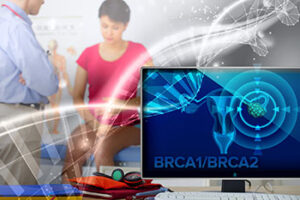 A Sarnoff Center Associate Board member on learning about BRCA and why it’s important to educate our community:
A Sarnoff Center Associate Board member on learning about BRCA and why it’s important to educate our community:
I found out about the existence of the BRCA mutation when I was 21, which is the exact same time that I found out it runs in my family. I had previously known that one of my family members had breast cancer at a relatively young age, but it never occurred to me before then that there could be a genetic predisposition running through my DNA.
When I first heard the news about my family carrying instances of BRCA, it was because my cousin was going through genetic testing for it. She knew that her side of the family carried it, and wanted to find out sooner rather than later so she could take the appropriate steps given the outcome. What really struck me was her attitude about it–she knew that if she tested positive, she would get a mastectomy as soon as possible after that and that would be it. Her
courage is something that really stuck with me–and then I started asking my own parents questions.
As it turned out, my dad had never been tested for a mutation in the BRCA genes. This sparked a debate about who should get tested first, and even though he’s deathly afraid of needles, my dad got voted into the genetic counselor’s office first. Luckily, he tested negative for a BRCA mutation. My mom isn’t biologically Jewish, so the chances that my brother or I have the mutation are slim. We’ll both be tested soon, but for now we are breathing a little easier.
What shocks me is how many women my age (26) don’t know about the BRCA mutation. Even with celebrities like Angelina Jolie getting elective double mastectomies, or organization like the Sarnoff Center and Bright Pink spreading the word, it seems that more Jewish women don’t know about the mutation than do. And it’s important–your chances of getting breast and/or ovarian cancer with the BRCA mutation are way too high for comfort.
Just this past year, a woman my age in Chicago got a double mastectomy after hearing that she had the BRCA mutation. I am so, so proud of her for sharing her story and educating others. I know that she has helped spread awareness like crazy, especially through sharing her journey on social media.
I’m proud to be on the associate board of the Norton and Elaine Sarnoff Center for Jewish Genetics because our community needs to know about genetic diseases that can affect their lives. I’m committed to spreading the word about the BRCA mutation and other Jewish genetic diseases because I want to see people live long, healthy, joyful lives.
Photo credit: National Human Genome Research Institute


